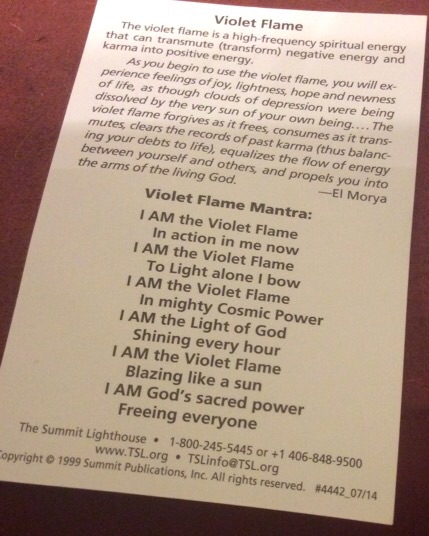As a lawyer who studied free speech extensively in law school, controversies pitting religious liberty and accommodation against employer demands are of particular interest. Two simmering issues surrounding the actions of flight attendants bring this legal tension to our attention once again.
Issue One – FA passes out religious material to passengers as they exit the aircraft.
Issue Two – Muslim FA refuses to serve alcohol to passengers onboard, citing deeply held religious belief.
A bit more background.
On a recent United Express flight, operated by Skywest, a FA passed out the cards below, which are printed by The Summit Lighthouse, a propaganda arm of the cult known as Church Universal and Triumphant.


Thanks to Flyertalk member miko2a for the pictures and for bringing the story to my attention
I’d say that message is a little out there…but protected speech? We will return to this.
The Muslim FA was hired by ExpressJet and then converted to Islam, working a deal with her colleague before each flight to avoid serving alcohol. The FA flew larger regional jets with two FAs and did not run into any issues for nearly two years. But then one day a fellow FA was not in a cooperative mood, and complained to ExpressJet that she had to do extra work (and also complained about her colleague’s head scarf not conforming with uniform regulations).
The Muslim FA was placed on unpaid administrative and has filed a complaint with the Equal Employment Opportunity Commission (EEOC) and stated, “I don’t feel like I should have to choose between practicing my religion properly and earning a living.”
Does she have a point?
The EEOC mandates that employers provide reasonable accommodation to prevent religious discrimination:
Religious Discrimination & Reasonable Accommodation
The law requires an employer or other covered entity to reasonably accommodate an employee’s religious beliefs or practices, unless doing so would cause more than a minimal burden on the operations of the employer’s business. This means an employer may be required to make reasonable adjustments to the work environment that will allow an employee to practice his or her religion.
Examples of some common religious accommodations include flexible scheduling, voluntary shift substitutions or swaps, job reassignments, and modifications to workplace policies or practices.
We saw the limits of this guideline tested in the Abercrombie and Fitch case last term on the U.S. Supreme Court, in which the High Court held that A&F violated the rights of a Muslim prospective employee by not hiring her on the grounds that she wore a head scarf. Though violating the “Abercrombie look book” (a neutrally-applied style guide for all employees), the Court nevertheless held 8-1 that the EEOC policy is not about neutrality, but grants religious practice “favored treatment”. In other words, even neutral polices must “give way to the need for an accommodation” of an applicant’s or employee’s religious practices.
Whether it be county clerks refusing to issue marriage licences or FAs refusing to serve adult beverages, it is strange to me that one would cling to a job whose duties including work that violates their conscience. But based upon the Abecrombie verdict, I expect ExpressJet to cave in on this one.
We hear often that FA’s “are here primarily for your safety” and that plays into the argument that the airline could easily make a “reasonable adjustment” as mandated under the EEOC guideline, for the observant FA. After all, things seemed to be working fine for two years.
But where is the limit? Imagine if two FAs, both devout Muslims, found themselves working a flight together. Would alcohol not be offered? Wearing a cross or head scarf may be one thing, but what are the limits? What constitutes religion and what makes some faith traditions valid and others not? If a FA has a deeply-held religious belief and begins to proselytize to those who will listen, must that be tolerated too, as long as the drinks and meals have already been served?
I happen to think protections for religious exercise are a valuable and laudable workplace right, but the outer bounds of these protections test our ability to ever peacefully reconcile a workplace right to religious accommodation with an employer’s valid interest to protect its own image and brand.
Doesn’t a FA thanking passengers for “flying United”, wearing a United Airlines uniform on plane with United’s livery seem to put United’s imprimatur on her Church Universal and Triumphant tracts? Does a FA flying for Delta Connection who refuses to serve alcohol to passenger send the message that Delta judges those who drink alcohol?
Here’s what I know — when I step on an airplane, the last thing I want to be told is how to live my life. Just get me from point A to point B please and leave the moralizations to ensuring my seat belt is on tight and mobile phone is in non-transmit mode. If I want your advice, I will ask for it.
The beauty of these issues, well at least on the alcohol question, is that a compelling legal (not necessarily a moral or practical or logical) argument can be made on both sides, so it will be interesting to see how this plays out.
What do you think? Do religious accommodations matter and do you see a difference between refusing to serve alcohol and passing out religious literature to voluntary takers?




If you’re incapable of doing your job fully due to your religious beliefs, then find another job. What’s annoying about this is the Kentucky clerk who keeps refusing to issue marriage certificates to gay couples gets props, while the flight attendant is vilified.
http://lordsofthedrinks.com/2013/08/06/muslims-can-drink-just-like-mohamed/
No religious reason not to serve the drinks and do her job
Donations for the Reverend Moon?
Jews for Jesus?
Read about Jehovah’s Witness?
How about Buddhism?
Jerry’s Kids?
Scientology?
More nuclear power?
Or, to be more serious… and surely, I can’t be serious:
Christian has the right idea in bringing up the Kentucky clerk. It’s part of her job to carry out the policies of her employer. If she can no longer do so, then she should be allowed to be reassigned with no loss of pay or benefits within the organization. Like workman’s comp, except in this case the religion is the disability.
Anyway, there should be a firm separation between one’s morals – which are personal and defined internally – and one’s ethics, which are defined situationally and externally. Surely, there should be no conflict between having Christian or Muslim morals and the ethics of civil society.
I am serious. And don’t call me Shirley.
Here’s your legal assessment of the state of our new world of PC and the ‘sensitive generation’: an unmitigated mess. These aren’t adults, these are child-adults who have a chip on their shoulder – due to life’s ‘hardships’ no doubt. If these two cases are found in favor of the two then we’ll see a unravelling. I buy a ticket to fly on an airplane: The pilots fly the plane, the cabin crew provides customer service onboard like serving food and drink (yes, including alcohol) and that’s it. These people inject complications of their own making and should be summarily fired for their wholly non-related activities.